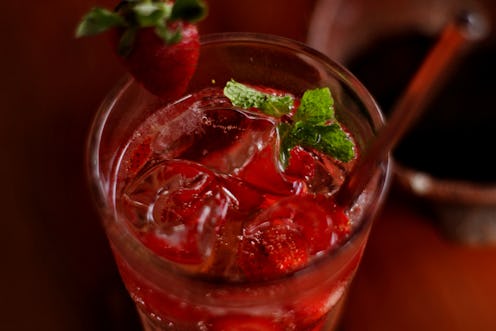
For many of us, the idea of alcohol and sleep go together like, well, like red wine and getting sleepy after drinking a glass of red wine. In fact, for those of us who experience occasional sleeplessness, a nightcap might seem like a good way to fall asleep after a long, anxious day — you probably feel like it helps you relax, takes your mind off whatever weird thing you said to your boss in the elevator ("Don't you just love leap years?"), and eases you to bed. And if you do think that, you're not alone — 20 percent of Americans use alcohol as a sleeping aid. But despite the conventional wisdom, booze is no sleep tonic — in fact, drinking before bed can lead to poor sleep and even insomnia.
See, booze might indeed knock you out initially — as someone who just this weekend fell asleep on the couch with the remote in my hand after some pinot grig, I won't fight you on that. But that initial burst of sleepiness will most likely be followed by a night of patchy, inconsistent sleep as your body metabolizes the alcohol.
Why? Recent research has yielded a few different answers. A 2013 review of literature about sleep and alcohol confirms that any amount of alcohol does help people initially fall asleep (I know what you're thinking — where was this published, the Journal of Duh Studies?). The study also found that this lead to a "consolidation" of sleep in the first half of the night — a deep sleep with no dreams.
However, as the night goes on, metabolization of the booze interferes with your usual sleep cycles, leading to fewer REM cycles, less deep sleep, and higher odds that you'll be awakened. Sleep also impacts brain wave function as we sleep — subjects in a 2015 study who were observed sleeping after consuming alcohol were found to have both delta brain waves (those common to deep sleep that help us feel restored) and alpha brain waves (the kind our brains would produce if we were resting quietly but awake). The alpha waves essentially cancel out the positive functions of the delta waves, which causes disrupted sleep.
And women's sleep is more easily impacted by alcohol than men's — a 2011 study conducted by the National Institute on Alcohol Abuse and Alcoholism found that while men's sleeping patterns were only lightly disrupted by booze, women who had been drinking slept 20 minutes less over the course of the night on average, woke up more often than men throughout the night, and were awake for longer periods of time each time they woke up.
Dr. Irshaad Ebrahim, medical director at the London Sleep Centre, advised the BBC that to avoid sleep disruptions, we should stop drinking an hour and a half to two hours before we go to bed, while sleep medicine specialist Dr. Dianne Augelli suggested on Oprah Network's #OWNShow that we stop drinking three to four hours before bed to be safe.
But randomly waking up in the middle of the night isn't the only problem that drinking late in the day can cause.
It Could Give You Breathing Trouble
Alcohol relaxes our muscles — and for those of us already prone to snoring or other sleep-related breathing troubles, this can make our pre-existing problems worse. As Dr. Augelli said on #OWNShow, "People who snore and have obstructive sleep apnea will have more muscle relaxation of their airway muscles. [Drinking] will worsen their snoring and worsen their breathing at night."
It Might Make You Have To Pee
Alcohol is a diuretic — which means that alcohol causes you to urinate more than non-alcoholic beverages. That's why you eventually have to pee after drinking, regardless of whether or not you "break the seal." It's also why two glasses of beer will end with you peeing more than if you had two glasses of water. And if you go to sleep right after drinking, odds are high that the urge to urinate will wake you up.
It Increases The Odds That You'll Have A Nightmare
According to neurologist and sleep expert Dr. Jessica Vensel-Rundo, talking to Cleveland Clinic, alcohol in your system makes you more likely to have extremely vivid dreams and nightmares. Will those nightmares be about how you've been snoring and peeing all night? Best to not find out, friend.
Images: Malik Pb / EyeEm/EyeEm/Getty Images; Giphy